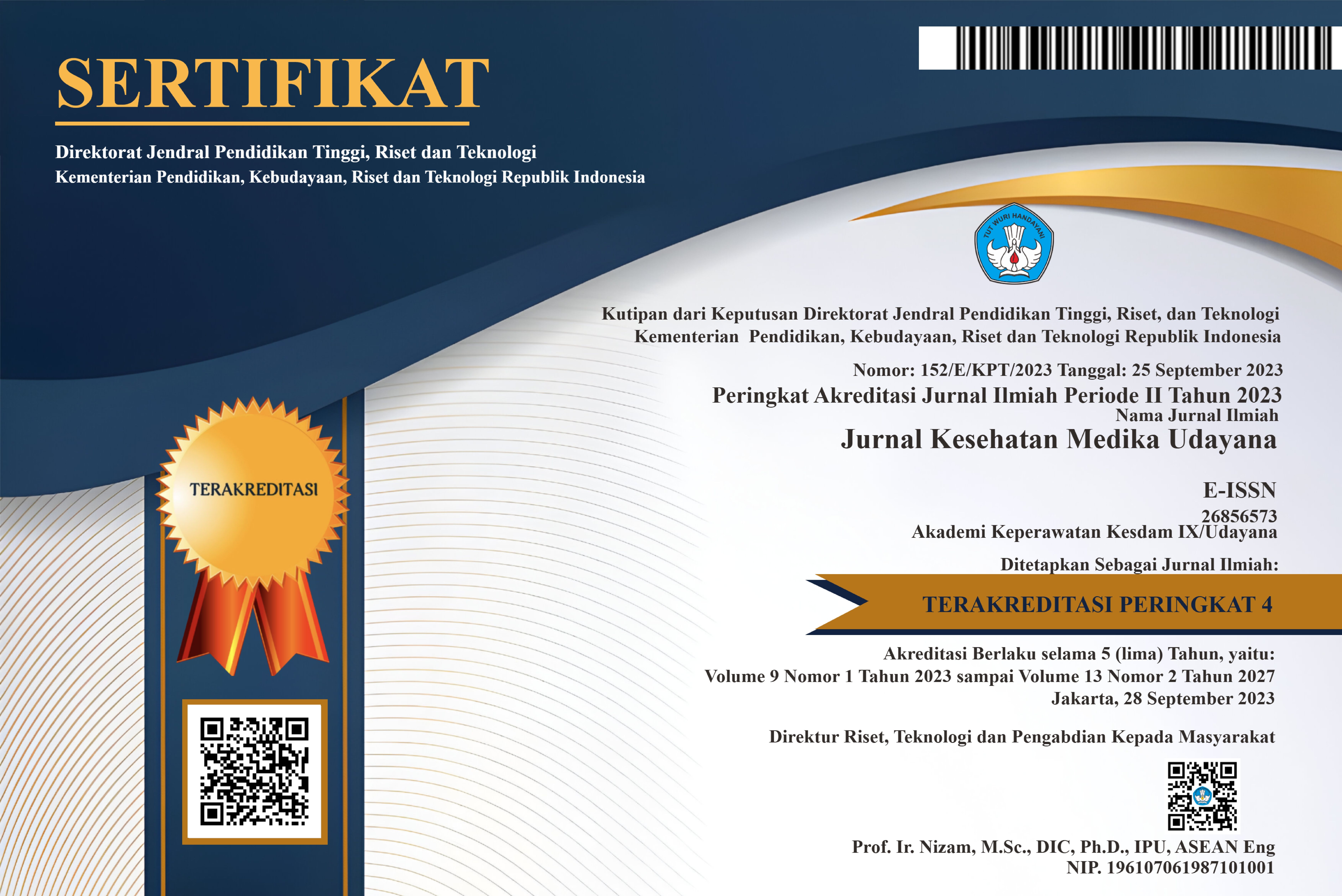Hubungan Dukungan Sosial Terhadap Quality of Life Pada ODHA (Orang dengan HIV/AIDS)
DOI:
https://doi.org/10.47859/jmu.v10i01.446Keywords:
Dukungan sosial, Quality of life, ODHA, HIV/AIDSAbstract
Background: HIV or Human Immunedeficiency Virus is a disease that attacks the human immune system so that this disease causes a weakening of the immune system to fight a disease. While AIDS or Acquired Immunne Deficiency Syndrome is a collection of diseases caused by a decrease in the human immune system caused by HIV infection. A person infected with HIV / AIDS will feel depressed, unable to accept the situation, feel helpless and experience fear for the future. This is because in Asia the negative stigma of HIV/AIDS is still very high. Thus, it is very necessary to know the relationship of social support to the quaity of life for PLHIV at Bangli General Hospital. Purpose: The purpose of this study was to determine the relationship of social support to the quaity of life in PLHIV. Methods: The research method used quantitative analytics with a cross sectional approach using primary data with data collection instruments in the form of questionnaires distributed to 60 respondents where the sampling technique used was the Non Probability Sampling technique with a saturated sampling method carried out in November-January 2024 at Bangli General Hospital. Data were analyzed univariately and bivariately chi square. Results: The results showed that there was a significant relationship between social support for quality of life in PLHIV with a p value of < 0.05 which means ha was accepted and h0 was rejected. Conclusion: Social support is very influential on the quality of life in PLHIV. The better the support provided, the higher the quality of life that will be owned by PLHIV.
References
Agustin, L. (2018). Hubungan Antara Spiritualitas Dengan Quality of Life Pada Orang Dengan Hiv/Aids (Odha).
Anderson, K., Pramudo, S. G., & Sofro, M. A. U. (2017). Hubungan Status Gizi Dengan Quality of Life Orang Dengan Hiv/Aids Di Semarang. Jurnal Kedokteran Diponegoro, 6(2), 692–704.
Alva,C.,Mardiana,N.,& Intan,G.P. (2018)Hubungan Antara Dukungan Keluarga Dengan Quality of Life Pada Orang Dengan HIV dan AIDS.Jurnal Kesehatan Prima.Mataram
Attari, K. (2018). Dukungan Sosial Pada Penderita Hiv/Aids Atau Odha. 2–6. Universitas Ahmad Dahlan,Yogykarta
Azizah. (2011). Kebidanan Lanjut Usia. 120 Juli. Https://Doi.Org/10.1167/Iovs.06-0496
Diatmi, K., & Fridari, I. G. A. D. (2014). Hubungan Antara Dukungan Sosial dengan Quality of Life pada Orang Dengan HIV dan AIDS ( ODHA ) Di Yayasan Spirit Paramacitta. Jurnal Psikologi Udayana, 1(2), 353–362.
Ekasari et al. (2018). Meningkatkan Quality of Life Lansia Konsep Dan Berbagai Strategi Intervensi. In Wineka Media.
Hidayat, A. (2009). Metode Penelitian Kebidanan Teknik Analisis Data. In Salemba Medika. https://doi.org/S0021915099001161 [pii]
Kemenkes RI.2019.Laporan Situasi Perkembangan HIV/AIDS & PMS di Indonesia
Kusuma, H. (2016). Faktor-Faktor Yang Mempengaruhi Quality of Life Pasien Hiv/Aids Yang Menjalani Perawatan Di Rsupn Cipto Mangunkusumo Jakarta. Media Medika Muda, 1(2).
Lubis, L., Sarumpaet, S. M., & Ismayadi, I. (2016). Hubungan Stigma, Depresi Dan Kelelahan Dengan Quality of Life Pasien Hiv/Aids Di Klinik Veteran Medan. Idea Nursing Journal, 7(1), 1–13.
Notoatmodjo, S. (2012). Metodologi Penelitian Kesehatan. https://doi.org/10.1590/S1516-18462008000300012
Noviana, N. (2016). Konsep HIV/AIDS Seksualitas & Kesehatan Reproduksi (1st ed.). Jakarta Timur: Trans Info Media.
Novrianda, D., Nurdin, Y., & Ananda, G. (2018). Dukungan Keluarga Dan Quality of Life Orang Dengan Hiv / Aids Di Lantera Minangkabau Support. Jurnal Ilmu Kebidanan Medial Bedah 1, 1(1), 26–37.







